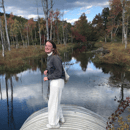After being stuck in what feels like a permanent pandemic, returning to campus or arriving for the first time has been especially thrilling for university students. It seems as if everyone picked up a new hobby or two during lockdown. I learned and perfected the art of making bread and even painted my entire room. But after hearing about one friend’s intense workout routine which includes running five miles uphill everyday, or seeing another friend’s perfected graphic design portfolio, I began to feel like I had done nothing useful with my time.
No longer stuck in school for most of my day, I had the time to follow my passions—or so I thought. The problem was that I had too much time. Without deadlines or obligations, I could no longer measure my productivity. I would prolong simple chores like washing dishes or vacuuming, and while I was doing one of those chores, I would get distracted.
Before quarantine, I spent all day in school. After that, I would go to sports practice. On the weekends, I worked. I had to manage my time efficiently or else nothing would get done. I noticed that if I had a week off during the school year, I was not very productive.
Needless to say, the pandemic brought forth a new genre of free time. Unlike any other school break, I didn’t know when I would go back to school or start working again. I found myself thinking, “Why should I finish this today when I have the next three months to do it?” With this pattern of thinking, tasks that would usually take a day or two were put off for weeks.
“Well, there’s always tomorrow,” I would tell myself.
I felt guilty as I heard about my peers’ productive lockdown experiences…they accomplished all of their goals and now have a flourishing portfolio of extracurriculars that they are ready to discuss. And, while I wasn’t as conventionally productive, I learned a lot about myself.
To begin, I know that I can’t work from home. I would never get anything done and procrastination would take over. Secondly, I know that I need to stay busy and set deadlines in order to be productive. For me, deadlines are a temporary form of stress which spare me from long-term mayhem. Without these safety nets which exist in the form of deadlines, I feel lost trying to tackle an entire project in a day, and if I can’t finish it, I’ll feel even worse than when I started.
Finally, I learned that productivity isn’t always visual. I treated the first couple weeks of quarantine as an extended spring break. In the following weeks, I was left to make up for the time when I lagged behind – all the while trying to enjoy new and old hobbies.
After trying to make up for all this accumulated work, I reflected on my semester and why the pandemic put me behind in my academics and extracurriculars. This reflection helped me identify the conditions in which I thrived and the conditions where I felt trapped in a bubble of procrastination. This revelation may not be something I can put on a resumé, but it was paramount to my pandemic experience.
As someone who always feels the need to stay busy, lockdown was a nice opportunity to unwind and it may appear that unwinding was all I did. However, the lessons I learned during that time have allowed me to enjoy healthier and less stressful school years in university. And for me, that’s more valuable than any quantifiable achievement.


